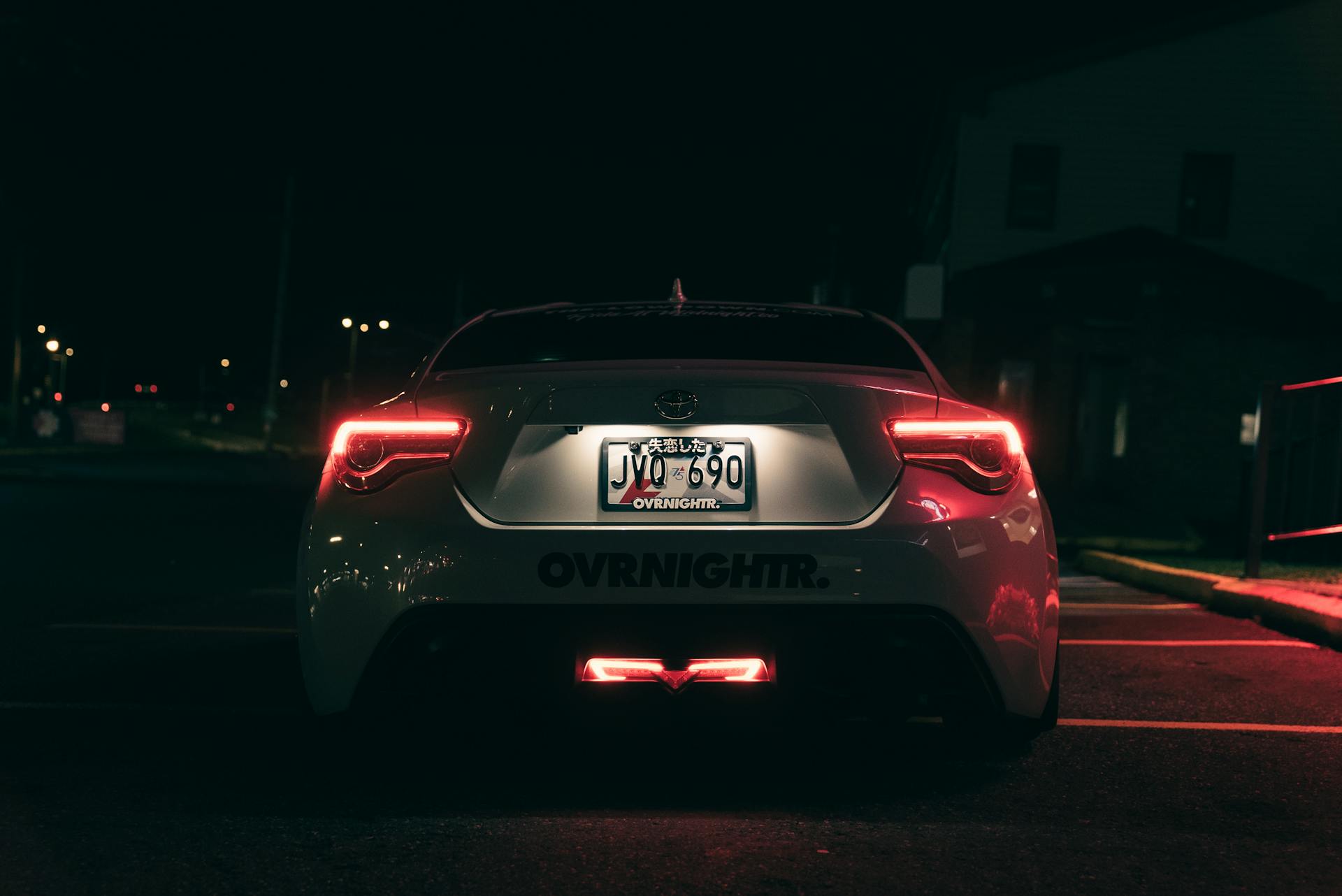
To become a mortgage loan officer in Illinois, you'll need to meet the state's licensing requirements. This includes completing 20 hours of pre-licensing education and passing a licensing exam.
The pre-licensing education requirement is a one-time thing, and you'll need to complete it within one year of applying for your license. You'll also need to pass a background check.
Nationwide, the licensing requirements for mortgage loan officers are overseen by the Secure and Fair Enforcement for Mortgage Licensing (SAFE) Act. This federal law requires mortgage loan officers to register with the National Mortgage Licensing System (NMLS).
Curious to learn more? Check out: Can You Have More than One Payday Loan
Licensing Requirements
To get your mortgage loan officer license, you'll need to meet the federal and state licensing requirements. The SAFE Act established a federal licensing system for mortgage originators, requiring a minimum age of 18 to become a federally licensed MLO.
You'll need to complete 20 hours of pre-licensure training, which can be found through the NMLS. Many states also impose additional education requirements, so be sure to check your state's specific licensing conditions.
A unique perspective: Which Federal Loan Servicer Should I Choose for Consolidation
The SAFE Mortgage Loan Originator Test is a must-pass exam that requires a score of 75% or higher. The test is 190 minutes long and costs $110, and you'll need to schedule it at your convenience.
To register with the NMLS, you'll need to submit Form MU4R and obtain an NMLS number that acts as a unique identifier. Typically, the MLO's employer initiates and pays for the NMLS registration.
Here are the federal licensing requirements:
- Minimum Age: 18
- Mortgage Originator Education: 20 hours of pre-licensure training
- Mortgage Originator Licensing Exam: Pass the SAFE Mortgage Loan Originator Test with a score of 75% or higher
- NMLS Registration: Submit Form MU4R and obtain an NMLS number
Remember to check your state's specific licensing requirements, as they may vary. For example, in Illinois, you'll need to review the state-specific licensing requirements through the NMLS Resource Center, State Licensing website.
You might like: Predatory Lending Laws by State
License Application
To get your mortgage loan officer license, you'll need to submit an application through the National Mortgage Licensing System (NMLS). You can find information about the MLO license application on the NMLS Resource Center website.
Before you start the application process, you'll need to obtain a personal NMLS ID number. This can be done by registering with the NMLS, which will give you an individual NMLS ID number that you can use throughout your career as a licensed loan officer.
The cost to submit your mortgage officer license application varies by state. In Illinois, for example, the cost is $30 for the NMLS application fee, $200 for the state agency application fee, and $15 for the credit report fee.
To submit your mortgage license application, you'll need to complete your Individual Form (MU4) and pay the required fees through your NMLS portal. This is a crucial step in the licensing process.
Here are some entities that must obtain a RMLO license, depending on the types of loans they originate:
- Chapter 342 Regulated Lenders (if they originate secondary mortgage loans)
- Chapter 347 Manufactured Housing Creditors
- Chapter 348 Motor Vehicle Dealers (if they originate retail installment contracts secured by dwellings)
- Chapter 351 Property Tax Lenders (if they originate residential property tax loans)
NMLS Account and ID
To get started with becoming a mortgage loan officer, you first need to request an NMLS account. This is done through the Nationwide Multistate Licensing System & Registry (NMLS).
If you already have an NMLS account, you can skip this step and move on to adding Illinois to your mortgage license. The NMLS account is a one-time process that will serve as the foundation for your future as a licensed loan officer.
Once you've registered with the NMLS, you'll receive a unique personal NMLS ID number that will be used throughout your career. This ID number is shared across all states you might consider getting licensed in, including Michigan, Indiana, and Ohio.
The NMLS ID number is an essential part of your licensing process, and you'll use it to track your progress and access your account information.
Illinois State Requirements
To get licensed as a mortgage loan officer in Illinois, you'll need to review the state-specific licensing requirements. Check the Illinois state-specific licensing requirements through NMLS Resource Center, State Licensing website.
You'll need to complete 20 hours of pre-licensing coursework that covers mortgage industry fundamentals, financial regulations, ethics, and professional conduct.
Illinois State Requirements
To get licensed as a mortgage loan officer in Illinois, you'll need to complete 20 hours of pre-licensing coursework. This covers a range of topics, including mortgage industry fundamentals, financial regulations, ethics, and professional conduct.

You can complete this coursework with a provider like Oncourse Learning, which is recommended by Morty's Platform Loan Officer program.
To review Illinois state-specific mortgage licensing requirements, check the NMLS Resource Center, State Licensing website. This will give you the additional steps required to obtain your MLO license in Illinois.
You'll also want to familiarize yourself with the primary state statute, Chapter 180, Texas Finance Code: Texas SAFE Act, and OCCC's Rules, Title 7, Chapter 2, Texas Administrative Code.
National and Illinois Pre-Licensing Coursework
To become a mortgage loan originator in Illinois, you'll need to complete national and state-specific pre-licensing coursework. This typically involves 20 hours of pre-licensing education.
Morty recommends Oncourse Learning as a pre-licensing course provider, but you can also search for other approved providers through the NMLS.
In addition to the national requirements, Illinois has its own set of requirements for pre-licensing education. You can find these requirements on the NMLS Resource Center or State Licensing website.
A good place to start is by reviewing the Illinois state-specific licensing requirements and completing the required 20 hours of pre-licensing coursework. This will cover topics such as mortgage industry fundamentals, financial regulations, ethics, and professional conduct.
Related reading: What Degree Is Needed for a Loan Officer
Seeking Sponsorship in Illinois

If you're looking to become a licensed mortgage originator in Illinois, you'll need to find a mortgage company willing to sponsor your license. You can consider reaching out to a technology-enabled online licensed mortgage broker like Morty, which offers a better mortgage experience through its lender marketplace and competitive pricing.
Morty provides loan officers and their clients with a seamless mortgage experience, thanks to its affordability tools and underwriting technology.
Take a look at this: How to Become a Loan Officer with No Experience
Background Check and Application
To become a licensed mortgage loan officer, you'll need to complete a background check and submit your application through the NMLS portal.
Maryland requires only a Federal criminal background check, which can be requested via NMLS.
You can access the functionality to request and pay for a federal criminal background check within your NMLS account.
The cost of both the background check and fingerprinting is $36.25.
To obtain a copy of your court disposition, you'll need to contact the court that heard your case.
Here's an interesting read: Federal Shariah Court Verdict on Interest System in Pakistan
Here's a step-by-step guide to completing your background check and submitting your application:
- Request a federal criminal background check through NMLS.
- Pay the $36.25 fee for the background check and fingerprinting.
- Get fingerprinted.
- Obtain a copy of your court disposition by contacting the relevant court.
- Submit your mortgage license application through the NMLS portal, including completing the Individual Form (MU4) and paying the required fees.
Originator Requirements
To become a mortgage loan originator, you'll need to meet certain requirements. The SAFE Act, a federal law, established a federal licensing system for mortgage originators to prevent untrained or unscrupulous brokers from engaging in misrepresentation, fraud, or other harmful conduct.
The minimum age to become a federally licensed MLO is 18 years old. You'll also need to complete 20 hours of pre-licensing training, which can be obtained from approved providers listed on the NMLS website. Many states impose additional education requirements, so be sure to check your state's licensing conditions.
Mortgage loan originators must also pass a national exam on basic knowledge of mortgage law and ethics to become licensed. The exam costs $110 and can be taken through the NMLS testing site. Some states may require separate MLO tests, so be sure to check your state's requirements.
You might like: Payday Loan United States
Originator Requirements
To become a mortgage loan originator, you'll need to meet some specific requirements. The minimum age to become a federally licensed MLO is 18.
First, you'll need to complete 20 hours of pre-licensing education, which can be done through an NMLS-approved provider. Many states also have additional education requirements, so be sure to check your state's specific rules.
You'll also need to pass a national exam on mortgage law and ethics, which can be taken through the NMLS testing site. The fee for the exam is $110, and you'll need to get a passing score of 75% or higher.
In addition to the federal exam, you may also need to take a separate test required by your state. To register with the NMLS, you'll need to submit Form MU4R and obtain an NMLS number, which will serve as your unique identifier.
Here's a breakdown of the basic requirements:
Remember, these requirements are in place to help prevent untrained or unscrupulous brokers from engaging in misrepresentation, fraud, or other harmful conduct. By meeting these requirements, you'll be well on your way to becoming a licensed mortgage loan originator.
Continuing Education
Continuing Education is a requirement for maintaining your Mortgage Loan Originator (MLO) or AIP-MLO license. You'll need to complete 8 hours of Continuing Education (CE) each year prior to renewal.
The SAFE Act mandates this requirement, and you can find approved continuing education courses on the NMLS Resource Center. This is a must-do to stay compliant and keep your license active.
To fulfill the CE requirements, you'll need to take 8 hours of continuing education annually, prior to the renewal of your MLO or AIP-MLO license. The CE standards are prescribed by Md. Code Ann., Fin. Inst. § 11-612 and the SAFE Mortgage Licensing Act.
Here are the CE requirements you need to know:
- 8 hours of CE required annually prior to renewal
- Approved continuing education courses can be found on the NMLS Resource Center
By staying on top of your continuing education requirements, you'll be able to maintain your MLO or AIP-MLO license and continue to work in the industry.
Frequently Asked Questions
How long does it take to become a loan officer in GA?
To become a loan officer in GA, you'll need to complete a 20-hour licensing course, which is the standard requirement. After completing the course, you can apply for your loan officer license and start your career.
How to get a MLO license in Wisconsin?
To become a Mortgage Loan Originator (MLO) in Wisconsin, you must complete a Criminal Background Check, authorize a credit report, meet state and federal education requirements, and pass a National Test. Start your MLO journey by reviewing Wisconsin's specific licensing requirements and application process.
Sources
Featured Images: pexels.com


